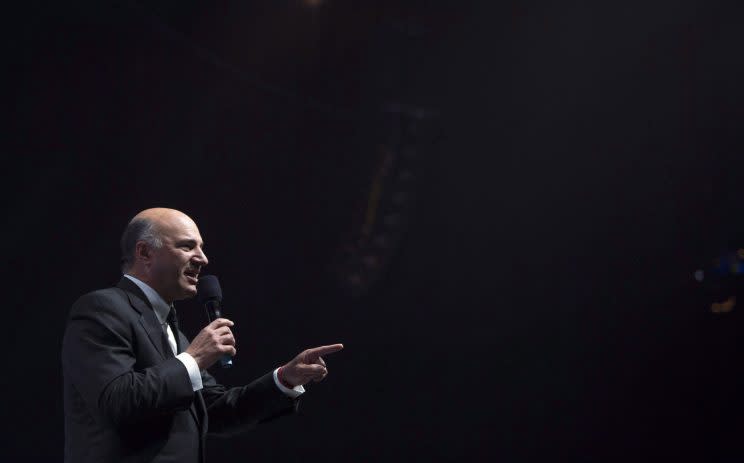Quebec media calls O'Leary a 'coward' for avoiding French language debate

Coward.
That’s the verdict of Quebec’s largest circulation news outlet after businessman Kevin O’Leary announced his candidacy for the federal Conservative leadership the morning after the leaders’ French-language debate.
Columnist Yves Boisvert, in La Presse, lambasted O’Leary for what he called an obvious ploy to avoid the debate.
“To not speak French and seek to be prime minister of Canada is already galling. But to wait until the day after the debate in French to announce his candidacy? That takes quite a coward,” Boisvert wrote.
Calling O’Leary a “Canadian pseudo-Trump,” the Quebec columnist says if O’Leary had any courage he would have taken the stage with the other 13 candidates in Quebec City, he should have “owned it.”
Most of those who did take part struggled, Boisvert wrote, “but at least they were there… they showed a minimum of respect.” O’Leary, who initially tested the Conservative waters saying a leader does not need to speak French, has since said he would try to learn.

It is fairly modern political etiquette that the Canadian prime minister should speak both official languages.
Francophones Wilfrid Laurier and Pierre Elliott Trudeau spoke English fluently, but it wasn’t until Brian Mulroney that an Anglophone showed any aptitude for la langue francais.
It was unilingual Lester B. Pearson who passed the Official Languages Act in 1969.
The question arises regularly, said Monica Heller, a professor at the University of Toronto and author who researches language and identity.
By not speaking French – or Indigenous languages for that matter – she says the message is: “English is the language of power. Get over it,” Heller told Yahoo Canada News.
“It’s not a good move if what you want to do is signal that I’m the prime minister of all Canadians… It’s a matter of saying to a whole bunch of people who have been in this country for a long time, ‘I don’t care about you.’”
The French language debate sans O’Leary has been widely mocked in Quebec for the awkward exchanges that took place in, at best, Franglais.
“There may be a question here as well of why are they [the Conservatives] unable to attract more candidates who are more bilingual than most of their candidates?” Heller said.
In 2011, 17.5 per cent of Canadians – 5.8 million people – reported being able to converse in both English and French, according to Statistics Canada.
In Quebec, 42.6 per cent said there were bilingual; in the rest of Canada that figure was 9.7 per cent.
But bilingualism has the support of the vast majority of Canadians, says the country’s former Official Languages commissioner.
Graham Fraser commissioned a poll on bilingualism before leaving office late last year.
In a recent article in Policy Magazine, Fraser says 88 per cent of Canadians polled by Nielsen support the aims of the Official Languages Act and 84 per cent say they are personally in favour of bilingualism for all of Canada.
Most notably, though, 86 per cent say the prime minister should be bilingual.
“The poll demonstrates that Canadians believe that bilingualism is a prerequisite for political leadership and a reasonable requirement for those who wish to be appointed to the Supreme Court,” Fraser wrote.
“Of the various hard decisions that parties and governments have to make, requiring political leaders and judges on the Supreme Court to be bilingual is clearly not one of them. Canadians understand what some potential political leaders and ambitious lawyers have failed to grasp: there are some jobs in Canada for which bilingualism is an essential leadership competency.”



